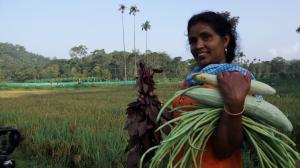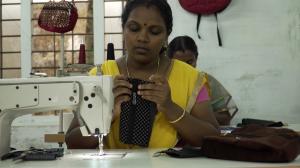
EXPOSED: The Eastern Models Are Making Western Economics Look Obsolete - Success Stories from Kerala and Bangladesh

Kerala's Kudumbashree comes into focus in a new award-winning documentary film, "Saving Walden's World
Asian Models bring Sustainable Success to Kerala and Bangladesh
For many years, we believed in the supremacy of the United States. The nation where dreams come true. But what if I told you a trip around the world in search of alternative pathways made me think twice about what governments truly provide for their people? Some numbers were shocking.
Take, for example, Kerala's extraordinary story – how a southern state of India, one-tenth the size of California but with a similar population, empowered nearly 5 million women. By creating the world's largest women’s empowerment project, they've shown that another world is possible.
Kerala's Kudumbashree comes into focus in a new award-winning documentary film, "Saving Walden's World," that I spent 8 years creating. The film has now played at over 20 international film festivals on four continents, racking up 14 awards. By 2021, Kerala had driven its multidimensional poverty rate to just 0.7 percent while the USA stood at 13 percent. What makes this even more remarkable is that Kerala's per-capita GDP is 24 times lower. By 2023, Kerala reduced the multidimensional poverty rate to just 0.55 percent.
This policy proposal outlines how to scale Kerala's proven Kudumbashree model and Bangladesh's Grameen Bank success story globally, based on decades of documented evidence and real-world results.
The Shocking Truth About Where Real Innovation Happens.
While Silicon Valley talks about disruption, Kerala quietly disrupted poverty itself. Starting in 1998, the state's Kudumbashree program – meaning "prosperity of the family" in Malayalam – organized women into neighborhood groups with weekly contributions of just 10 Rupees (approximately 12 cents USD). The result? Academic research indicates that 55% of participants achieved a medium level of empowerment, while 19% reached a high level of empowerment.
As M B Rajesh, the minister for Local Self Governance Department (LSGD), noted: "The social, economic and political status of women in Kerala shall be defined before Kudumbashree and after Kudumbashree. Such is the impact created by the organisation in their lives."
Bangladesh's Quiet Revolution That Shamed Wall Street.
Then there's Bangladesh's Grameen Bank – a financial institution that achieved what Wall Street couldn't: 98% loan repayment rates while serving the world's poorest women. With 10.70 million borrowers, 98% of them women, Grameen proved that poor women aren't just creditworthy – they're often more reliable than wealthy borrowers.
As Muhammad Yunus stated in his Nobel Prize lecture: "Today, Grameen Bank gives loans to nearly 7.0 million poor people, 97 per cent of whom are women, in 73,000 villages in Bangladesh."
Yunus further noted: "Cumulatively, the bank has given out loans totaling 6 billion USD. The repayment rate is 99%. Grameen Bank routinely makes a profit. Financially, it is self-reliant and has not taken donor money since 1995."
The Earth-Saving Economics Hidden in Plain Sight
Here's what opens your eyes: these aren't just poverty programs. They're environmental solutions disguised as economic policy. When women control resources, they invest in sustainable practices, education, and community resilience. During COVID-19, Kudumbashree served as the nodal agency for crisis management, manufacturing masks, operating community kitchens, and creating safety nets that governments couldn't provide.
The Numbers That Should Shock Every American Policymaker
While America celebrates if women get 2.3% of venture capital funding, Grameen made 97% of its loans to women. While we debate gender equality, Kerala achieved it through economic empowerment that rippled through entire communities. Research shows microfinance participation reduced moderate poverty by 5% and extreme poverty by 10% in Bangladesh. According to Grameen Bank's internal survey, 58 percent of borrowers have crossed the poverty line.
Real Quotes from Real Leaders
As Yunus explained to students at Georgetown University, "Our job is not to listen to what they say. Our job is to peel off the fears, layer by layer, so that some day one of these women will feel encouraged and say, 'maybe I should try.'
"One Grameen borrower, Mazeda Begum, put it like this: "My parents gave me birth, but Grameen Bank gave me a life". Yunus concluded his Nobel lecture with this vision: "We have created a slavery-free world, a polio-free world, an apartheid-free world. Creating a poverty-free world would be greater than all these accomplishments, while at the same time reinforcing them."
Policy Framework for Global Implementation
Based on documented success from Kerala and Bangladesh, a global scaling initiative could include:
Community-Level Organization: Following Kudumbashree's three-tier structure for its women community network, with Neighborhood Groups (NHGs) at the lowest level, Area Development Societies (ADS) at the middle level, and Community Development Societies (CDS) at the local government level.
Government Integration: Replicating Kerala's integration with local self-government institutions that ensures large-scale mobilization of women in community activities. Solidarity Lending: Adopting Grameen's proven group-based lending model with its exceptional repayment rates.
Comprehensive Support: Beyond credit, providing business training and community leadership development as demonstrated in both models.
Kerala's Historic Zero Poverty Declaration
The proof of these models' effectiveness comes from Kerala's unprecedented achievement. Chief Minister Pinarayi Vijayan announced that "Kerala will be free from extreme poverty by November this year", making it the first Indian state to achieve this milestone.
The Light That Shines Through
In 2012, Kudumbashree was recognized as a National Resource Organisation (NRO) by the Ministry of Rural Development (MoRD), Government of India.
As Yunus noted: "This idea, which began in Jobra, a small village in Bangladesh, has spread around the world and there are now Grameen-type programs in almost every country."
The light that shines through our global predicament isn't coming from where we expected. It's coming from women in Kerala and Bangladesh who never stopped believing in prosperity for all and have proven it's possible. If Kerala comes even close to its goal of zero extreme poverty by November 2025, it will stand as living proof that these models work at scale.
Jim Merkel
Saving Walden's World
email us here
Distribution channels: Agriculture, Farming & Forestry Industry, Culture, Society & Lifestyle, Education, Environment, World & Regional
Legal Disclaimer:
EIN Presswire provides this news content "as is" without warranty of any kind. We do not accept any responsibility or liability for the accuracy, content, images, videos, licenses, completeness, legality, or reliability of the information contained in this article. If you have any complaints or copyright issues related to this article, kindly contact the author above.
Submit your press release

